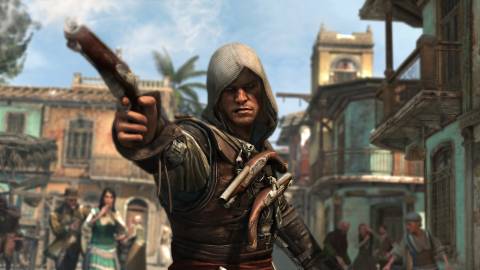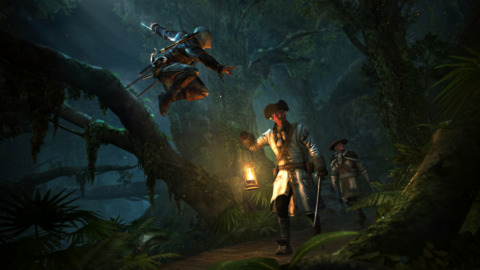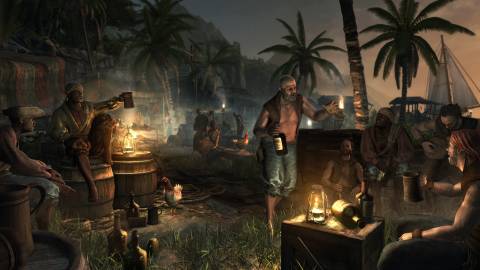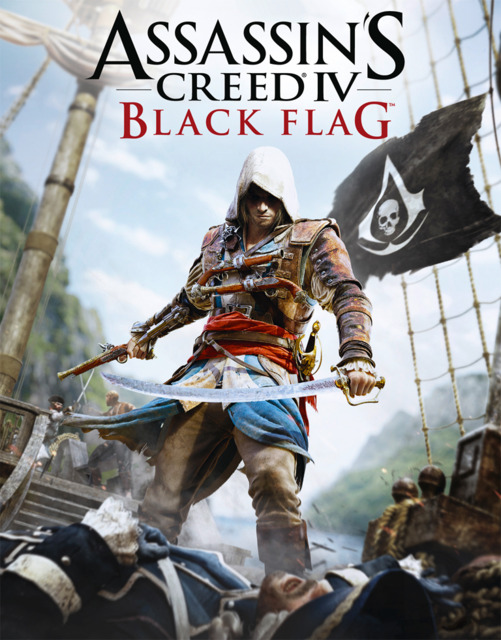While the series' dated mechanics are still wearing thin, the injection of more naval combat is incredibly enjoyable
Hands up if you’ve grown tired of the Assassin’s Creed franchise over the past few years. There’s probably a lot of you.
After progressive sequels in the shape of Assassin’s Creed II and Brotherhood, the yearly cycle of historical hood-wearing and neck stabbing began to grow stale. Revelations didn’t introduce the kind of refreshing changes seen in the previous two sequels and Assassin’s Creed III was a dull, glitchy disappointment despite the occasional thrill. This felt like a series in freefall, beginning an annualised path to mediocrity whilst its popularity remained intact.

So it comes with unexpected elation that Assassin’s Creed IV: Black Flag refuses to continue the downward spiral many expected it to. In taking the best part of Assassin’s Creed III (naval combat) and building an entire game around it, Ubisoft Montreal have surpassed expectations with one of the most entertaining games in the series.
With Desmond Miles’ story wrapped up in turgid fashion at the end of AC III you get the feeling that the development team were given the freedom to do as they please. This shows in Black Flag’s offbeat modern-day sections as you’re cast in the role of a silent, un-named employee of Abstergo Entertainment, the videogame development arm of the Templars’ evil corporation. As you tour their Montreal studio for the first time you might recognise a few familiar faces on the walls, while your employee handbook reveals some interesting titbits such as their development of Assassin’s Creed III: Liberation and some ties with a certain Ubisoft.
It’s just the right amount of absurdity to get behind, particularly after Desmond’s solemn tale failed to live up to its early potential. Plus, it puts you right back into the Animus as you’re tasked with sifting through the memories of another of Desmond’s ancestors to research Abstergo’s next great pirate game. Of course, things are slightly more nefarious than that and you’ll spend the majority of your modern-day time interacting with shady characters and hacking into your co-workers computers for some expository infodumps that fill in the events of the past year. It’s essentially a collection of mini-games with some interesting story beats thrown in towards the end, but this only amounts to a fraction of your playtime so it doesn’t get in the way.
The majority of your time will be spent on the seas and islands that make up the Caribbean. You play as Edward Kenway, a protagonist with a devil-may-care attitude more in-line with series favourite Ezio Auditore than anyone else – which is fitting for an adventure about swashbuckling privateers.

His affiliation with the Assassins is refreshing tenuous, reflecting the attitude of the player at this point. Kenway begins the game assuming the identity of a traitor Assassin after they’re both shipwrecked following an explosive naval battle. This Assassin had been working with the Templars to track down a mysterious structure known as The Observatory, meant to house powerful technology both sides are vying for. Edward cares little about this, viewing the ancient structure as a treasure to be plundered to increase his minimal renown with untold glory and ample riches. All with the hopes of winning back his estranged wife, of course.
It’s a different approach for the series and its protagonists, but one that mostly succeeds. Edward is still on the periphery for much of the narrative as it focuses on key historical events, but you wouldn’t have it any other way. His character arc is engaging by itself, with a satisfying and surprisingly poignant payoff, while his interactions with the diverse cast of enemies, friends and betrayers results in some of the series’ greatest moments. Black Flagcontinues the series’ knack of humanizing historical legends: you witness the ingenuity of the fearsome Blackbeard, explore the motives behind the pirate-turned-pirate-hunter Benjamin Hornigold and meet both Anne Bonny and Mary Read, the two most infamous female pirates of the era. It’s fantastic stuff.
Unfortunately the same cannot be said once you set foot on land, although a few core series mechanics have been refined. There’s a greater emphasis on stealth, with most sneaking accomplished by dashing between vegetation and foliage. It’s an inelegant method but at least it’s more consistent than it was inAC III, despite how oblivious it makes enemies look. Stealth is rarely required in interesting situations though. Black Flag opts for the “follow mission” far too often, usually in service of an exposition dump as you eavesdrop on myriad conversations. It was a tired design in the very first Assassin’s Creed, but now it feels like mindless second nature.
Elsewhere, platforming is as good as it’s ever been, the verticality of large cities like Havana providing the means to scale numerous man-made structures, while smaller islands present vast forests, ancient Mayan ruins and dangerous cliff faces to clamber across in typically fluid fashion. There’s a lot of diversity in how you navigate the world, while combat is also much the same, focusing on counters and parries with slick animation and brutal kills thrown in for good measure. It’s still serviceable but lacks any sort of challenge and is in need of a redesign for any future instalments.

So far, so Assassin’s Creed then. Where Black Flag differentiates itself is in its open-world sailing. This works much in the same way as it did in AC III, albeit on a larger scale. The map is huge with swathes of sea littered with a smattering of uninhabited islands, ports, sunken ships and enemy forts, along with the three larger cities. From the offset you can theoretically travel unimpeded, participating in various activities, from ship combat to underwater diving and even a spot of whaling. The only thing stopping you travelling where you please is the strength of enemy ships, forcing you to upgrade your own vessel (The Jackdaw) so you can venture further as it grows stronger.
When you encounter other ships you can use your spyglass to see how powerful they are and get a good look at their precious cargo, weighing up the risk and reward of engaging in battle. If you do decide to unleash the full complement of cannon fire, long-range mortars and fire barrels at your disposal, you’ll discover the thrilling naval combat as you attempt to outmanoeuvre and outgun your adversary. The controls are straightforward yet you can employ many tactics to position your ship and deploy a deluge of heavy weaponry to cripple your foes in a hail of white smoke and energetic cheers from your crew.
From here it’s time to plunder, boarding the incapacitated ship with a clash of swords and a seamless transition from one set of mechanics to another. Once you’ve worn down the crew and forced them to surrender, the cargo is yours, its materials used to upgrade the Jackdaw with an improved hull, more powerful broadside cannons and so on. You’re suitably rewarded for your efforts in a way AC III refused to do. While that game’s activities were bountiful, there were few tangible rewards for completing them and little reason to do them as a result. Black Flag fixes this, populating its world with a similar abbundance of side-quests but giving you plenty of reasons to do them.

You’ll hunt great white sharks and humpback whales to craft ammo pouches and better armour. You’ll go off in search of Templars for the keys they carry to open a locked safe housing a unique outfit, or track down buried treasure using a crudely drawn map. You might travel to a far-flung island to sneak into a warehouse and steal the materials needed to buy your next mortar upgrade, or chase down shanties because you love how your crew sings as you set sail on another adventure. It’s a vibrant world with many striking sights to seek but it also rewards you with meaningful stuff when you get there. There’s a fantastic sense of discovery, capturing the thrill of sailing the open sea and its limitless possibilities.
Assassin’s Creed IV: Black Flag is an ambitious game. It may stagnate in spots with an over-reliance on dreary eavesdropping missions, simple combat mechanics and multiplayer with no substantial additions, yet none of that seems to matter when you’re in the heart of a treacherous storm, rain and wind lashing down upon the crew of the Jackdaw as you fight to avoid the frightening pull of a nearby twister. There’s so much to see and do, with a vibrant world just begging to be explored, daring seafaring antics and a welcome cohesion between all of its parts. It’s difficult to imagine Assassin’s Creed ever leaving the sea behind.
